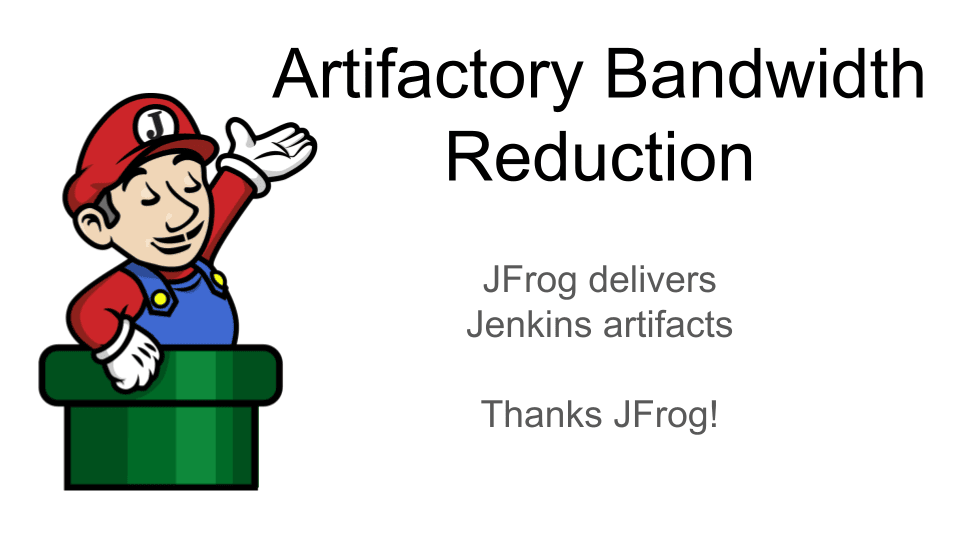Stop Caching Maven Central

JFrog has been a sponsor of the Jenkins project for many years. We’re delighted that they continue to sponsor the Jenkins project and continue to provide our artifact hosting service, repo.jenkins-ci.org.
Releases, incremental development builds, and snapshots of Jenkins core, Jenkins tooling, Jenkins plugins, and Jenkins infrastructure components are hosted on JFrog Artifactory. The worldwide Jenkins community has been well served for many years by JFrog’s hosted artifact repository.
Maven Central
Effective Thursday September 7, 2023, we will stop caching the Maven Central repository from repo.jenkins-ci.org. The change will be transparent to Jenkins developers because Apache Maven automatically appends the Maven Central repository to its list of repositories. Beginning Thursday September 7, 2023, Jenkins developers will receive Maven Central artifacts from Maven Central instead of receiving them from the Jenkins Artifactory.
In case of issues, please open a Jenkins help desk ticket.
If you’d like more details of the bandwidth misuse investigation, refer to the help desk ticket.
Bandwidth misuse - the long story
Bandwidth misuse can happen in many different ways. Most of our bandwidth misuse was innocent misconfiguration. You can benefit users, the Jenkins community, and Jenkins sponsors by better configuration.
When the bandwidth misuse was not innocent misconfiguration, it was bad programming and bad monitoring of a server. You can benefit users, the Jenkins community, and Jenkins sponsors by monitoring bandwidth used by your servers.
Correct tool configuration
Two cases involved a Jenkins tool binary that was being downloaded repeatedly from Artifactory. Ephemeral Jenkins agents were configured to download the tool every time they started. The download source was configured to read the tar.gz tool installer from the Jenkins Artifactory repository. Once the tool was downloaded from Jenkins Artifactory, it was unpacked, installed, and used.
The download process took time because it was reading from the public internet to a local agent. The unpack and install took time because it was performed every time an ephemeral agent started.
Please install remote tools onto the agent before connecting the agent to the controller
Please download a local copy of the tool if you must download tools onto the agent
Don’t waste the time and bandwidth to download and install a tool from a remote location after the agent starts. The OpenJDK project, Eclipse Temurin project, and the Apache Maven project all thank you for not repeatedly downloading the same binary from their servers. Jenkins thanks you as well.
Abuse reports to cloud providers
Another case involved a rogue server that was repeatedly downloading all versions of the Jenkins war files. That rogue server was using over 20TB per month for its repeated downloads of the same files.
We reported the misuse to the abuse reporting service of the cloud provider that was hosting the server. The abuse reporting service told us they would investigate. The cloud provider took no further actions.
Please choose cloud providers that honor abuse reports
We blocked the IP address of that server, hoping that the server would not switch to a new IP address and resume its abusive downloads. The IP block stopped the abusive requests.
Use local caching
Another case involved agents from the Jenkins project that were repeatedly downloading dependencies as part of their regular build processes. Because we prefer ephemeral agents, the dependencies were being downloaded to the newly launched agent while it was building Jenkins core and Jenkins plugins.
Herve Le Meur and Damien Duportal implemented an artifact caching proxy using nginx for each of the cloud providers that host agents for the Jenkins project. The artifact caching proxy is hosted on the same cloud provider that runs the agents. It caches requests from agents running on that cloud provider.
Mark Waite’s home lab appeared in the top 5 consumers in a slightly different case. Mark corrected job configuration errors in his home lab that were causing individual jobs to download all their dependencies to a job-specific cache folder. Job specific caching caused the discs to fill on his agents and wasted bandwidth from the repository server. Fixing the job configuration error removed that home lab from the list. Mark implemented a central cache in his home lab in an attempt to prevent the issue in the future.
Cache your dependencies
Use local drives and local servers to cache your dependencies so that they can be downloaded faster.
Summary
We’ve learned to analyze log files with SQL queries thanks to the Artifactory SQL tool provided by Basil Crow. We upload artifactory logs into a SQLite database and can then use SQL select statements to identify patterns and trends. Thanks to Basil for a very helpful analysis tool.
Special thanks to JFrog for their patience and perseverance while we worked through these improvements.